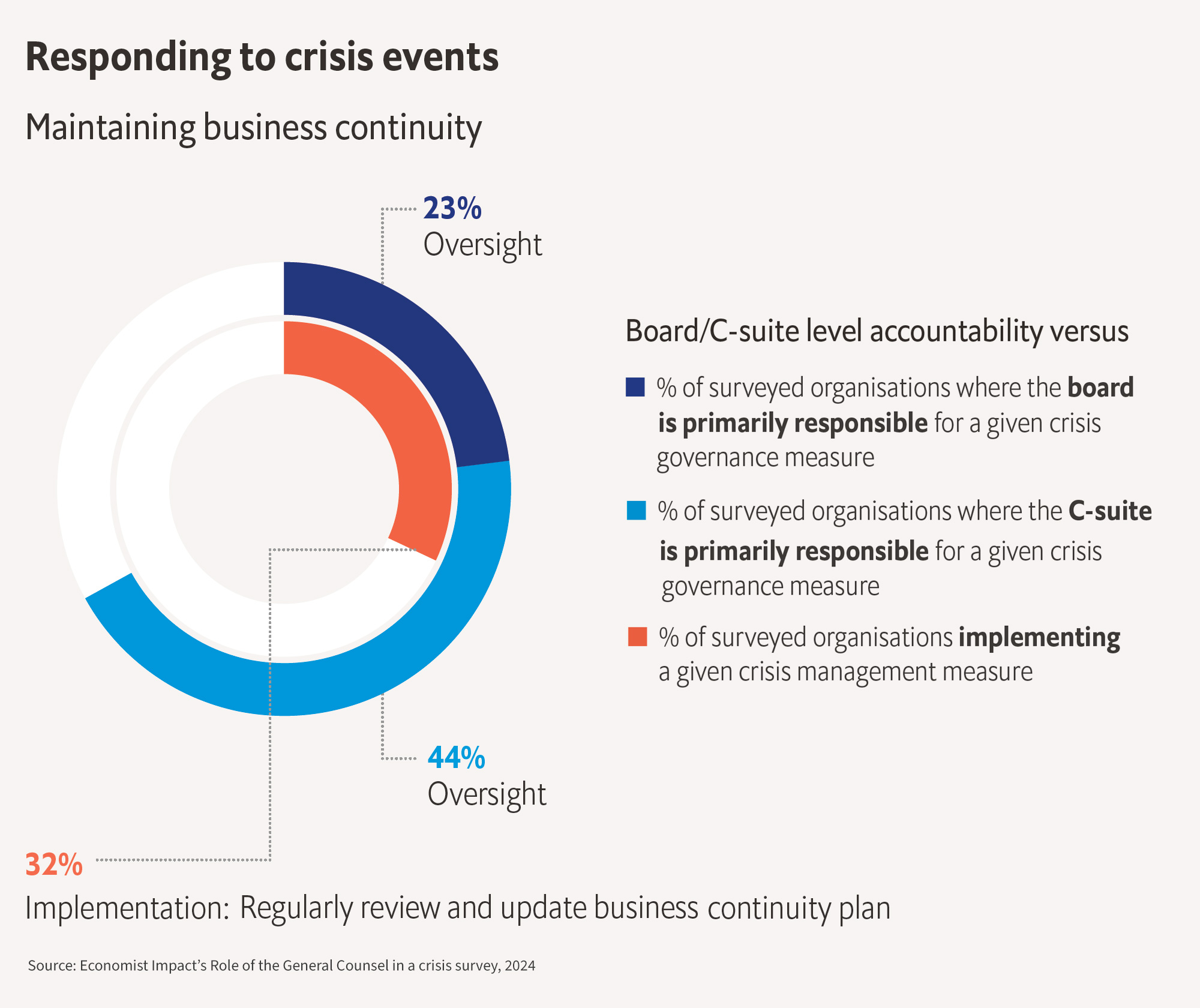- Articles
- / Beyond Crisis Management: General Counsel Takeaways in a Changing World
Beyond Crisis Management: General Counsel Takeaways in a Changing World
-
février 24, 2025
-
Businesses worldwide are closely monitoring the shifting geopolitical and economic landscape to assess its impact. When—not if—critical events occur, General Counsel (“GC”), often serving as crisis commanders, will be at the forefront of leading response efforts, even if the crisis isn’t strictly a legal issue. In this post, FTI Consulting’s EMEA Chairman Lars Faeste focusses on how General Counsels should respond to crisis events to effectively navigate risks.
In previous posts, I explored what crisis preparedness looks like from the perspective of key stakeholders, including law firms, private equity firms and boards. In this final post, I want to shift the focus to GCs, who will play a pivotal role in shaping how their organisations navigate rapidly evolving risks, from supply chain disruptions to cybersecurity threats and the responsible use of data and AI.
Nearly half of the GCs surveyed in the Economist Impact survey sponsored by FTI Consulting reported that they rely entirely or majorly on external legal support to navigate crises, reflecting the growing demands of their role. However, while external expertise provides valuable reinforcement, it is the foundational preparation can often be neglected. For example, three-fifths of GCs say their organisation scans for and escalates potential risks less than once a month—a startling statistic when early detection can be the key to averting or mitigating disaster.
Also concerning, is that despite high-level oversight for business continuity, only 32% of organisations regularly review and update their crisis management plans. This lack of action could expose critical gaps, making them more vulnerable and potentially worsening the impact of future crises. On the brighter side, 45% of GCs said their organisation is leveraging technologies like the Internet of Things (“IoT”) to enable real-time crisis management, signalling a shift toward integrating innovative solutions.
Closing the learning loop?
Board/C-suite level accountability versus action on different crisis management measures
Takeaways for Future Crisis Management
From my discussions with the GCs of many organisations, three strategies to strengthen crisis readiness emerge.
- Unseen to Seen: Revealing the Risks Others Don’t See
Effective crisis management starts with visibility. GC involvement in decision making across legal and business operations means they are uniquely positioned to help organisations uncover risks they might not be aware of—whether they concern the use of new technologies, commercial pivots or internal cultural issues. This requires systems for consistently scanning for red flags and ensuring escalation mechanisms are in place.
Beyond identifying risks, GCs must strengthen their presence in strategic decision-making. By securing a strong voice at the C-suite table, they can advocate for proactive measures, ensuring crisis preparation is a leadership priority.
- Resources: Building a Resilient Framework
Crisis preparedness isn’t just about knowing the risks; it’s about having the tools to respond effectively. This includes clear crisis roadmaps, robust contingency plans, advanced or integrated technologies for improved reporting and a network of trusted external advisors.
Sixty percent of surveyed GCs highlighted their reliance on external expertise for effective crisis management. This emphasises the value of strong external relationships—whether with legal experts, communications professionals or industry specialists—that bring an outside-in perspective, enhance agile decision-making and provide essential support to internal teams.
Internally, alignment across functions is equally critical to ensure a coordinated response. GCs stress the importance of both networks and planning to maintain control when the unexpected occurs.
- Practice: Turning Plans into Action
Too many organisations fail to test their crisis plans. Simulation exercises allow teams to rehearse their roles, identify weaknesses and build confidence before a real crisis strikes. These drills are essential for translating theoretical plans into actionable responses and allowing these plans to be revised in advance of any real crisis.
Redefining Leadership in Crisis
As crisis events grow in scale and complexity, GCs are redefining what it means to lead in challenging times. Their expanded role highlights the importance of preparation, collaboration and innovation in protecting organisations.
By focusing on visibility, resources and practice, GCs are setting a blueprint for effective crisis management. In doing so, they not only safeguard their organisations but also demonstrate how leadership must evolve to meet the demands of an uncertain future.
This article is part of the “Mastering Crises” series, a collection of insights on crisis management featuring FTI Consulting’s Chairman of EMEA, Lars Faeste. Explore the other articles in this series below.

The Role of Law Firms in Crisis Management
Crisis prevention is a priority for organizations. We sponsored a global Economist Impact survey of 600 legal decision-makers to assess progress in this area.
Click here to read the full article.

Operational Resilience: A Cornerstone for Value Creation in Private Equity
The private equity (“PE”) industry drives growth and transformation, but focusing on operational resilience is often overlooked yet vital for PE success.
Click here to read the full article.

How Boards Can Navigate Crises in an Era of Upheaval
How Boards must lead crisis management, ensuring resilience, agility and strategic oversight that strengthens governance in uncertain times.
Click here to read the full article.

Turbulent Waters, Trusted Anchors: The General Counsel’s Evolving Role in Navigating Crises
As the general counsel role evolves into crisis leadership, what measures can organizations take to prepare for more severe events in today’s environment?
Click here to read the full report.
Related Information
Published
février 24, 2025



